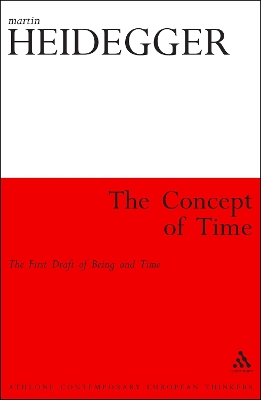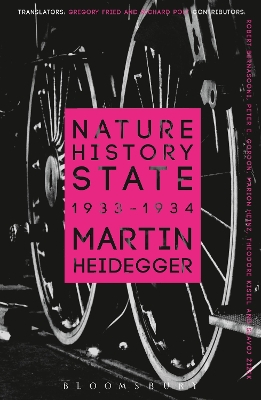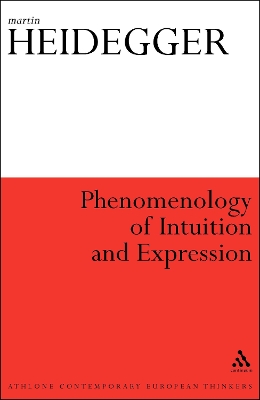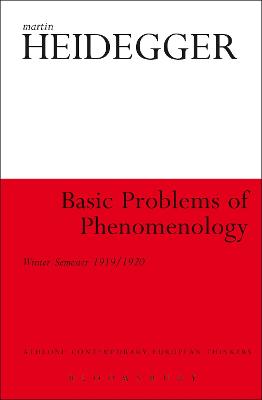Athlone Contemporary European Thinkers
5 total works
This brand new translation of Martin Heidgger's Mindfulness (Besinnung) makes available in English for the first time Heidegger's second major being-historical treatise. Here Heidegger returns to and elaborates in detail many of the individual dimensions of the historically self-showing and transforming allotments of be-ing. In addition to the main text, this volume also includes two further important texts, A Retrospective Look at the Pathway (1937/8) and 'The Wish and the Will (On Preserving What is Attempted)' (1937/8), in which Heidegger surveys his unpublished works, gives instructions for their eventual publication, talks about his relationship to Catholic and Protestant Christianity, and reflects on his life's path. This is a major new translation of a key text from one of the most important thinkers of the twentieth century.
This volume is translated by Parvis Emad, Emeritus Professor of Philosophy at DePaul University, Chicago, and Thomas Kalary, Professor of Philosophy at Suvidya College, Bangalore.
This volume is translated by Parvis Emad, Emeritus Professor of Philosophy at DePaul University, Chicago, and Thomas Kalary, Professor of Philosophy at Suvidya College, Bangalore.
The Concept of Time presents Heidegger's so-called Dilthey review, widely considered the first draft of his celebrated masterpiece, Being and Time. Here Heidegger reveals his deep commitment to Wilhelm Dilthey and Count Yorck von Wartenburg. He agrees with them that historicity must be at the centre of the new philosophy to come. However, he also argues for an ontological approach to history. From this ontological turn he develops the so-called categories of Dasein.
This work demonstrates Heidegger's indebtedness to Yorck and Dilthey and gives further evidence to the view that thought about history is the germ cell of Being and Time. However, it also shows that Heidegger's commitment to Dilthey was not without reservations and that his analysis of Dasein actually employs Husserl's phenomenology. The work reopens the question of history in a broader sense, as Heidegger struggles to thematize history without aligning it with world-historical events. The text also provides a concise and readable summary of the main themes of Being and Time and as such is an ideal companion to that text.
This work demonstrates Heidegger's indebtedness to Yorck and Dilthey and gives further evidence to the view that thought about history is the germ cell of Being and Time. However, it also shows that Heidegger's commitment to Dilthey was not without reservations and that his analysis of Dasein actually employs Husserl's phenomenology. The work reopens the question of history in a broader sense, as Heidegger struggles to thematize history without aligning it with world-historical events. The text also provides a concise and readable summary of the main themes of Being and Time and as such is an ideal companion to that text.
Nature, History, State: 1933-1934 presents the first complete English-language translation of Heidegger's seminar 'On the Essence and Concepts of Nature, History and State', together with full introductory material and interpretive essays by five leading thinkers and scholars: Robert Bernasconi, Peter Eli Gordon, Marion Heinz, Theodore Kisiel and Slavoj Zizek.
The seminar, which was held while Heidegger was serving as National Socialist rector of the University of Freiburg, represents important evidence of the development of Heidegger's political thought. The text consists of ten 'protocols' on the seminar sessions, composed by students and reviewed by Heidegger. The first session's protocol is a rather personal commentary on the atmosphere in the classroom, but the remainder have every appearance of being faithful transcripts of Heidegger's words, in which he raises a variety of fundamental questions about nature, history and the state. The seminar culminates in an attempt to sketch a political philosophy that supports the 'Fuhrer state'. The text is important evidence for anyone considering the tortured question of Heidegger's Nazism and its connection to his philosophy in general.
The seminar, which was held while Heidegger was serving as National Socialist rector of the University of Freiburg, represents important evidence of the development of Heidegger's political thought. The text consists of ten 'protocols' on the seminar sessions, composed by students and reviewed by Heidegger. The first session's protocol is a rather personal commentary on the atmosphere in the classroom, but the remainder have every appearance of being faithful transcripts of Heidegger's words, in which he raises a variety of fundamental questions about nature, history and the state. The seminar culminates in an attempt to sketch a political philosophy that supports the 'Fuhrer state'. The text is important evidence for anyone considering the tortured question of Heidegger's Nazism and its connection to his philosophy in general.
Phenomenology of Intuition and Expression is a crucial text for understanding the early development of Heidegger's thought. This lecture course was presented in the summer semester of 1920 at the University of Freiburg. At the center of this course is Heidegger's elaboration of the meaning and function of the phenomenological destruction. In no other work by Heidegger do we find as comprehensive a treatment of the theme of destruction as in this lecture course. Culminating in a destruction of contemporaneous philosophy in terms of its understanding of 'life' as a primal phenomenon, this lecture course can be seen to open the way towards a renewal of the meaning of philosophy as such.
This hugely important philosophical work is now available in English for the first time.
This hugely important philosophical work is now available in English for the first time.
Basic Problems of Phenomenology presents the first English translation of Martin Heidegger's early lecture course from the Winter of 1919/1920, in which he attempts to clarify phenomenology by looking at the phenomenon of life, which he sees as the primary area of research for phenomenology. Heidegger investigates the notions of life and world, and in particular the self-world, Christianity, and science in an attempt to discern how phenomenology is the primordial science of life and how phenomenology can take account of the streaming character of life. Basic Problems of Phenomenology provides invaluable insights into the development of Heidegger's thoughts about human existence up to Being and Time. It also offers a compelling insight into the nature of the world and our ability to give an account of human life. As an account of Heidegger's early understanding of life, the text fills an important gap in the available literature and represents a crucial contribution to our understanding of the early Heidegger.




